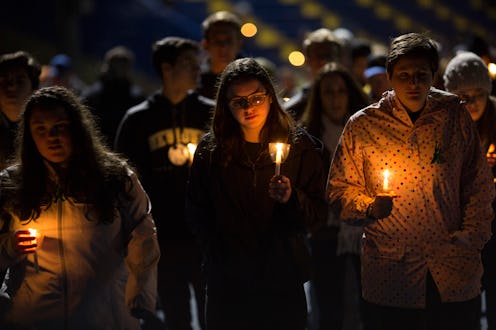
With the anti-gun violence National School Walkout day set for April 20, you might be wondering if there are places in America where assault weapons are banned entirely. The national discussion on mass shootings and assault weapons has taken on momentum after a gruesome shooting struck Marjory Stoneman Douglas High School in Parkland, Florida. The February shooting — which involved a military-style semi-automatic AR 15 — killed 17 people and intensified a demand among many Americans to outlaw assault weaponry.
Since there is no federal ban on assault weapons, states can pass their own measures to outlaw such possession. But there was a time when a federal law criminalized carrying assault weapons and large capacity ammunition. This law, known as the Public Safety and Recreational Firearms Use Protection Act, was passed in 1994 and expired in 2004 due its sunset clause. The sunset clause says that a particular law will no longer remain in effect after a specific date. For the federal ban on assault weapons, that date was Sept. 13, 2004.
When it comes to state bans on assault weapons, it depends on which jurisdiction you're in. So far, eight American states ban the manufacturing, possession, and distribution of assault weapons. So if a person is in California, Connecticut, Washington, D.C., Maryland, Hawaii, Massachusetts, New York, or New Jersey, they are not allowed to manufacture, possess, or transfer semi-automatic rifles, pistols, or shotguns.
Over varying years, different states in the country passed their own state-level bans. For instance, California became the very first American state to pass and enact a ban on assault weapons. This took place in 1989 shortly after a school shooting happened at Cleveland Elementary School in Stockton, California. The shooting, which killed six people and injured 32, led to the passing and approval of the Roberti-Roos Assault Weapons Control Act of 1989.
In 1993, the Connecticut General Assembly passed a ban on assault weapons with one critical caveat. If a resident of the state lawfully possessed an assault weapon prior to July 1, 1994, they are allowed to apply for a certificate of possession as long as keeping the weapon didn't violate the state's regulations on assault weapons.
In 1994, Massachusetts outlawed the possession and circulation of assault weapons and added that "large capacity feeding devices" that could be attached to a weapon were also out of the territory of legal weapons. For Hawaiians, the state is against the possession of semi-automatic assault handguns.
Other states like New York and New Jersey also have bans on state-level possession of assault weapons. For New Yorkers, the state stands against any kind of possession of a weapon that can produce more than 10 shooting rounds. Similar assault weapon bans are in effect for Maryland and Washington, D.C.
The debate on whether there ought to be a federal ban on assault weapons continues. While there are some observers who argue that a full-scale ban on assault weapons will have little to no effect on mass shootings, some say everyday Americans don't need to possess military-grade firearms. While writing for The Minnesota Post, Democratic Minnesota Sen. Bobby Joe Champion recently said that there is no justification in possessing an assault rifle. The senator wrote,
Assault rifles are not used for hunting. Assault rifles are not used for protection. Assault rifles are designed for the military to kill and to kill as many people as possible quickly and efficiently. There is no reason for people to have an assault rifle that can fire off rounds quickly.
Such weapons, Champion wrote, "cause more harm than good and are far from a necessity." Such a sentiment is also expanding to other places in the United States like Illinois where assault weapon possession could burn a hole in a local's wallet with a hefty fine. But whether one is for or against the idea, it's more than clear that the debate on assault weapons is a difficult, complicated, and emotionally-charged one.